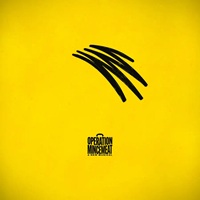 Original London Cast, 2023 (Sony Masterworks Broadway)
Original London Cast, 2023 (Sony Masterworks Broadway)  (3.5 / 5) This show was a smash hit in London, winning the Olivier Award for Best New Musical, and its original company of five actors transferred with the production to Broadway in early 2025. These talented performers — David Cumming, Jak Malone, Claire-Marie Hall, Natasha Hodgson, and Zoë Roberts — bring great intensity and ingenuity to the cast album as they juggle more than 50 different roles. Set during World War II, the preposterous yet historically accurate plot of Operation Mincemeat revolves around the British counter-intelligence department’s attempt to fool the Nazis with fake war plans they stash on a dead body disguised as a British soldier. While the premise and the conceit of the show may sound daunting, this recording is surprisingly enjoyable and easy to follow. The book and score were written by Cumming, Hodgson, Roberts, and Felix Hagan, collectively known as the musical comedy troupe SpitLip; the music is memorable and tuneful throughout, but listeners will have to endure some frequently awkward and ill-rhymed lyrics. Kicking off the album is a high-energy opening number, “Born to Lead,” that introduces listeners to the British MI5 team. Their personnel soon get to work creating a fake identity for the cadaver of a soldier in “Making A Man,” a song that perfectly establishes the largely humorous tone of the piece. But as the improbable (though true) story unfolds, several of the songs also capture the heart and humanity of the characters. Jak Malone, playing secretary Hester Leggatt, delivers the touching “Dear Bill,” in which Leggatt crafts a love letter for their decoy soldier to carry as a way of making their scheme more believable. Other songs that deserve special attention are Cumming’s solo, “Dead in the Water,” and a sweet duet titled “Useful,” sung by Malone and Hall. Overall, Mincemeat manages to balance a fascinating story with great entertainment, resulting in a very satisfying cast album. — Forrest Hutchinson
(3.5 / 5) This show was a smash hit in London, winning the Olivier Award for Best New Musical, and its original company of five actors transferred with the production to Broadway in early 2025. These talented performers — David Cumming, Jak Malone, Claire-Marie Hall, Natasha Hodgson, and Zoë Roberts — bring great intensity and ingenuity to the cast album as they juggle more than 50 different roles. Set during World War II, the preposterous yet historically accurate plot of Operation Mincemeat revolves around the British counter-intelligence department’s attempt to fool the Nazis with fake war plans they stash on a dead body disguised as a British soldier. While the premise and the conceit of the show may sound daunting, this recording is surprisingly enjoyable and easy to follow. The book and score were written by Cumming, Hodgson, Roberts, and Felix Hagan, collectively known as the musical comedy troupe SpitLip; the music is memorable and tuneful throughout, but listeners will have to endure some frequently awkward and ill-rhymed lyrics. Kicking off the album is a high-energy opening number, “Born to Lead,” that introduces listeners to the British MI5 team. Their personnel soon get to work creating a fake identity for the cadaver of a soldier in “Making A Man,” a song that perfectly establishes the largely humorous tone of the piece. But as the improbable (though true) story unfolds, several of the songs also capture the heart and humanity of the characters. Jak Malone, playing secretary Hester Leggatt, delivers the touching “Dear Bill,” in which Leggatt crafts a love letter for their decoy soldier to carry as a way of making their scheme more believable. Other songs that deserve special attention are Cumming’s solo, “Dead in the Water,” and a sweet duet titled “Useful,” sung by Malone and Hall. Overall, Mincemeat manages to balance a fascinating story with great entertainment, resulting in a very satisfying cast album. — Forrest Hutchinson
Category Archives: N-P
The Outsiders
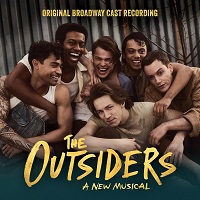 Original Broadway Cast, 2024 (Masterworks Broadway)
Original Broadway Cast, 2024 (Masterworks Broadway)  (3 / 5) The Outsiders followed the popular book-to-movie-to-musical path and arrived on Broadway in 2024. It started out as a novel written by teenage author S.E. Hinton, published in 1967, about two rival groups of teenagers separated by social status — the lower class greasers and the upper class “Socs.” The novel quickly became a staple for high school reading and was further ingrained in American culture via the 1983 Francis Ford Coppola film, with a cast of future stars including Tom Cruise and Rob Lowe. The musical retains much of the novel’s heavy plot and all of its earnestness, with songs by Broadway newcomers Jonathan Clay, Zach Chance, and Justine Levine. While the score pulsates with folk rhythms and country melodies, many of the lyrics are less than adept — for example, “It’s hard to write the story when the story’s writing me,” “It’s Friday night and it feels so right.” The novel was written in the first-person perspective, and the musical’s creators have not found a fully satisfactory way of balancing the exposition from the source material with the necessary dramatic elements required to tell the story on stage and through song. The main protagonist, a 14-year-old named Ponyboy Curtis (played and sung with sensitivity by Brody Grant), is a member of the greasers gang along with Johnny Cade (Sky Lakota Lynch), Sodapop (Jason Schmidt), Dally (Joshua Boone), and Ponyboy’s older brother, Darrel (Brent Comer). Despite violent confrontations between the rival gangs, Ponyboy makes a connection with one of the “Soc” girls, Cherry Valance (Emma Pittman). Refreshingly, though, the show avoids a Romeo and Juliet-like romantic storyline by focusing on the fraternal relationships among the greasers. In addition to the first few numbers being loaded down by exposition delivered directly to the audience, the score sometimes leans towards melodrama (for example, “Death’s at My Door” and “Throwing in the Towel”). But happily, when the conflict between the two gangs escalates, The Outsiders finds its footing and amps up the excitement in songs such as “Justice for Tulsa” and “Trouble.” The Dally character gets two stellar musical moments, the jazzy “Little Brother” and “Run Run Brother,” while the 11 o’clock number, “Stay Gold,” sung by Ponyboy and Johnny Cade, has the show’s most endearing melody, despite a distracting amount of reverb on this recording. All of the songs are aided mightily by Justine Levine’s fantastic orchestrations. — Forrest Hutchison
(3 / 5) The Outsiders followed the popular book-to-movie-to-musical path and arrived on Broadway in 2024. It started out as a novel written by teenage author S.E. Hinton, published in 1967, about two rival groups of teenagers separated by social status — the lower class greasers and the upper class “Socs.” The novel quickly became a staple for high school reading and was further ingrained in American culture via the 1983 Francis Ford Coppola film, with a cast of future stars including Tom Cruise and Rob Lowe. The musical retains much of the novel’s heavy plot and all of its earnestness, with songs by Broadway newcomers Jonathan Clay, Zach Chance, and Justine Levine. While the score pulsates with folk rhythms and country melodies, many of the lyrics are less than adept — for example, “It’s hard to write the story when the story’s writing me,” “It’s Friday night and it feels so right.” The novel was written in the first-person perspective, and the musical’s creators have not found a fully satisfactory way of balancing the exposition from the source material with the necessary dramatic elements required to tell the story on stage and through song. The main protagonist, a 14-year-old named Ponyboy Curtis (played and sung with sensitivity by Brody Grant), is a member of the greasers gang along with Johnny Cade (Sky Lakota Lynch), Sodapop (Jason Schmidt), Dally (Joshua Boone), and Ponyboy’s older brother, Darrel (Brent Comer). Despite violent confrontations between the rival gangs, Ponyboy makes a connection with one of the “Soc” girls, Cherry Valance (Emma Pittman). Refreshingly, though, the show avoids a Romeo and Juliet-like romantic storyline by focusing on the fraternal relationships among the greasers. In addition to the first few numbers being loaded down by exposition delivered directly to the audience, the score sometimes leans towards melodrama (for example, “Death’s at My Door” and “Throwing in the Towel”). But happily, when the conflict between the two gangs escalates, The Outsiders finds its footing and amps up the excitement in songs such as “Justice for Tulsa” and “Trouble.” The Dally character gets two stellar musical moments, the jazzy “Little Brother” and “Run Run Brother,” while the 11 o’clock number, “Stay Gold,” sung by Ponyboy and Johnny Cade, has the show’s most endearing melody, despite a distracting amount of reverb on this recording. All of the songs are aided mightily by Justine Levine’s fantastic orchestrations. — Forrest HutchisonThe Notebook
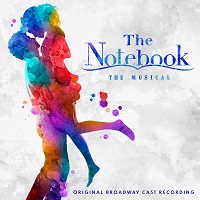 Original Broadway Cast, 2024 (Atlantic)
Original Broadway Cast, 2024 (Atlantic)  (3.5 / 5) The Notebook wears its heart on its sleeve. And why wouldn’t it? From Nicholas Sparks’ novel to Nick Cassavetes’ film to Ingrid Michaelson’s Broadway musical, the story of Noah, a boy from the wrong side of the tracks, and rich girl Allison, who fall in love as teenagers and stay in love for the rest of their lives, has touched people all over the world. The question presented by this cast album is: How many earnest pop ballads about love can fit in one musical? And the answer is, a surprising amount. Michaelson’s music is lush and catchy, and only in the latter part of the score does it begin to feel repetitive. Her lyrics, written more in the pop vein, often deal in false rhymes (“time/mine,” “coin/joy,” etc.), and in doing so, they don’t quite give the ear what it wants. These lyrics also lack some of the specificity that musical theater requires. But where the score comes up short, the wonderful performances of the six leading cast members who play Noah and Allie at three different stages of their lives make up for it. John Cardoza as Young Noah has an especially delightful, buttery voice that lends itself perfectly to Michaelson’s musical style, and the gruff sound of Dorian Harewood as Older Noah provides an excellent contrast to the expansive vocal quality of the four younger performers. One of the album’s greatest losses is Maryann Plunkett’s full performance as Older Allie. Since her character has dementia for the duration of the show, the authors choose not to have her sing until the finale. When Plunkett does sing, and also when she delivers the snippets of dialogue that are included on the recording along the way, she infuses the character with reality, fire, and beauty. Happily, there are plenty of delights even in her absence. If pop artists were still covering songs from musicals, a few numbers in this score could easily be stand-alone hits: “I’ll Leave the Light On,” Middle Noah’s tribute to the lover he’s gone too long without seeing, is deliciously mournful, and “If This Is Love,” Younger Allie’s account of her feelings towards Noah, is an innocent delight. But The Notebook is strongest as a musical theater recording, rather than a pop album, when it deals with more serious topics; “I Want to Go Back,” in which Younger and Middle Allie voice the frustrations of their older counterpart about being forced to stay in a hospital, is likely to give the listener goosebumps with its soaring melody and plaintive lyrics: “Is it time for dinner? / Is it time for forever?” Indeed, any time Noah and Allie sing in harmony across the generations, it’s immensely satisfying to the ear, their voices blending beautifully and hauntingly. These moments of intergenerational connection could’ve been less frequent in order to maximize their impact, but the listener will be grateful for the aural riches that are present. In live performances of The Notebook, the sounds of audience members sniffling, crying, and outright bawling can be heard during the show’s final scenes and even during the curtain calls. Listeners to the cast album may have a similar response, because even if the songwriting isn’t consistently up to par, it’s good enough to deliver a powerful emotional wallop. — Charles Kirsch
(3.5 / 5) The Notebook wears its heart on its sleeve. And why wouldn’t it? From Nicholas Sparks’ novel to Nick Cassavetes’ film to Ingrid Michaelson’s Broadway musical, the story of Noah, a boy from the wrong side of the tracks, and rich girl Allison, who fall in love as teenagers and stay in love for the rest of their lives, has touched people all over the world. The question presented by this cast album is: How many earnest pop ballads about love can fit in one musical? And the answer is, a surprising amount. Michaelson’s music is lush and catchy, and only in the latter part of the score does it begin to feel repetitive. Her lyrics, written more in the pop vein, often deal in false rhymes (“time/mine,” “coin/joy,” etc.), and in doing so, they don’t quite give the ear what it wants. These lyrics also lack some of the specificity that musical theater requires. But where the score comes up short, the wonderful performances of the six leading cast members who play Noah and Allie at three different stages of their lives make up for it. John Cardoza as Young Noah has an especially delightful, buttery voice that lends itself perfectly to Michaelson’s musical style, and the gruff sound of Dorian Harewood as Older Noah provides an excellent contrast to the expansive vocal quality of the four younger performers. One of the album’s greatest losses is Maryann Plunkett’s full performance as Older Allie. Since her character has dementia for the duration of the show, the authors choose not to have her sing until the finale. When Plunkett does sing, and also when she delivers the snippets of dialogue that are included on the recording along the way, she infuses the character with reality, fire, and beauty. Happily, there are plenty of delights even in her absence. If pop artists were still covering songs from musicals, a few numbers in this score could easily be stand-alone hits: “I’ll Leave the Light On,” Middle Noah’s tribute to the lover he’s gone too long without seeing, is deliciously mournful, and “If This Is Love,” Younger Allie’s account of her feelings towards Noah, is an innocent delight. But The Notebook is strongest as a musical theater recording, rather than a pop album, when it deals with more serious topics; “I Want to Go Back,” in which Younger and Middle Allie voice the frustrations of their older counterpart about being forced to stay in a hospital, is likely to give the listener goosebumps with its soaring melody and plaintive lyrics: “Is it time for dinner? / Is it time for forever?” Indeed, any time Noah and Allie sing in harmony across the generations, it’s immensely satisfying to the ear, their voices blending beautifully and hauntingly. These moments of intergenerational connection could’ve been less frequent in order to maximize their impact, but the listener will be grateful for the aural riches that are present. In live performances of The Notebook, the sounds of audience members sniffling, crying, and outright bawling can be heard during the show’s final scenes and even during the curtain calls. Listeners to the cast album may have a similar response, because even if the songwriting isn’t consistently up to par, it’s good enough to deliver a powerful emotional wallop. — Charles Kirsch
New York, New York
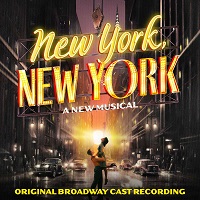 Original Broadway Cast, 2023 (Wine & Peaches LLC)
Original Broadway Cast, 2023 (Wine & Peaches LLC)  (0.5 / 5) New York, New York is destined to go down in musical theater history books for its creative team, which includes the legendary composer John Kander as well as director/choreographer Susan Stroman and lyricist Lin Manuel Miranda, who spearheaded the two most Tony-nominated musicals of all time. Unfortunately, the show itself will be remembered as a colossal disappointment: Rather than a love letter to the city that doesn’t sleep, or even to the post-WW II era in which the action takes place, what we have here is a misguided mishmash of weaker items from the Kander & Ebb repertoire forced into a stage musical with the number of main and featured characters greatly expanded from the film on which it is very loosely based. The plot largely concerns the troubled romance between struggling musician Jimmy Doyle and struggling singer Francine Evans, but the creators seem to have determined that these characters weren’t interesting enough for an entire show. As a result, also on hand to clutter up the proceedings are an Hispanic immigrant and his abusive father and loving mother, a cleaning woman turned opera singer, a Jewish immigrant and his violin teacher, et al. “A Quell ‘Amor,” performed by the newly minted opera singer, is perhaps the nadir of the show; it makes no sense in or out of context, we never hear from its singer again, and the song’s title is 50% of its lyrics. Indeed, lyrics are not the primary concern of this production, as shown by the inclusion of six extended instrumental pieces titled “Morning in New York,” “New York in the Rain,” “New York in the Summer,” “New York in the Snow,” “New York at Night,” and “New York Concerto.” (Orchestrators Sam Davis and Daryl Waters have done an admirable job of creating a period feel and an excitement that’s lacking in the plot.) One of the oddest aspects of the show and this album is the fact that Colton Ryan, who portrays Jimmy Doyle, sings every song as if he were being strangled, emitting some of the ugliest vowel sounds ever heard. On the other hand, Anna Uzele as Francine raises the roof with her big numbers, but her acting is not quite at the level of her vocal ability. The only two pitch-perfect performances are from Emily Skinner, as the aforementioned violin teacher, and the sadly underused Clyde Alves, as the leading man’s best friend. Four demo recording are appended to this album, and in the tracks where you can hear Fred Ebb singing his own material, you start to understand what this show could’ve been if that great lyricist had lived longer: a unique, biting, entertaining final curtain call for Kander & Ebb. Instead, listeners may end up, to quote one of the show’s stronger songs, sorry they asked. — Charles Kirsch
(0.5 / 5) New York, New York is destined to go down in musical theater history books for its creative team, which includes the legendary composer John Kander as well as director/choreographer Susan Stroman and lyricist Lin Manuel Miranda, who spearheaded the two most Tony-nominated musicals of all time. Unfortunately, the show itself will be remembered as a colossal disappointment: Rather than a love letter to the city that doesn’t sleep, or even to the post-WW II era in which the action takes place, what we have here is a misguided mishmash of weaker items from the Kander & Ebb repertoire forced into a stage musical with the number of main and featured characters greatly expanded from the film on which it is very loosely based. The plot largely concerns the troubled romance between struggling musician Jimmy Doyle and struggling singer Francine Evans, but the creators seem to have determined that these characters weren’t interesting enough for an entire show. As a result, also on hand to clutter up the proceedings are an Hispanic immigrant and his abusive father and loving mother, a cleaning woman turned opera singer, a Jewish immigrant and his violin teacher, et al. “A Quell ‘Amor,” performed by the newly minted opera singer, is perhaps the nadir of the show; it makes no sense in or out of context, we never hear from its singer again, and the song’s title is 50% of its lyrics. Indeed, lyrics are not the primary concern of this production, as shown by the inclusion of six extended instrumental pieces titled “Morning in New York,” “New York in the Rain,” “New York in the Summer,” “New York in the Snow,” “New York at Night,” and “New York Concerto.” (Orchestrators Sam Davis and Daryl Waters have done an admirable job of creating a period feel and an excitement that’s lacking in the plot.) One of the oddest aspects of the show and this album is the fact that Colton Ryan, who portrays Jimmy Doyle, sings every song as if he were being strangled, emitting some of the ugliest vowel sounds ever heard. On the other hand, Anna Uzele as Francine raises the roof with her big numbers, but her acting is not quite at the level of her vocal ability. The only two pitch-perfect performances are from Emily Skinner, as the aforementioned violin teacher, and the sadly underused Clyde Alves, as the leading man’s best friend. Four demo recording are appended to this album, and in the tracks where you can hear Fred Ebb singing his own material, you start to understand what this show could’ve been if that great lyricist had lived longer: a unique, biting, entertaining final curtain call for Kander & Ebb. Instead, listeners may end up, to quote one of the show’s stronger songs, sorry they asked. — Charles Kirsch
Prince of Egypt
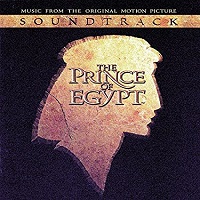 Film Soundtrack, 1998 (Dreamworks)
Film Soundtrack, 1998 (Dreamworks)  (3 / 5) Like several other animated musical classics of the screen, from Snow White to the clutch of far more recent Disney films (The Little Mermaid, Aladdin, Beauty and the Beast, Frozen, Coco, et al.), Prince of Egypt contains considerably fewer songs than would be included in a stage musical. But the songs with music and lyrics by Stephen Schwartz that are heard here, beautifully augmented by Hans Zimmer’s lush orchestral score, make for a thoroughly enjoyable listening experience. Highlights of what is basically an animated musical remake of The Ten Commandments (!!!!) include the powerful opening chorus of the Hebrew Slaves, “Deliver Us”; Moses’ plaintive “All I Ever Wanted,” sung by Amick Byram, with the “Queen’s reprise” delivered equally persuasively by Linda Dee Shayne; a weird, comic-villain number, “Playing with the Big Boys Now,” performed by Steve Martin and Martin Short as two of the Pharoah’s henchmen; the inspirational ballad “Through Heaven’s Eyes,” which allows us to revel in the wonderful Broadway baritone of Brian Stokes Mitchell; and the lovely duet “When You Believe,” prettily sung in pseudo pop-style by Michelle Pfeiffer and Sally Dworsky, with the bonus of a full-on pop version by Mariah Carey and Whitney Houston. — Michael Portantiere
(3 / 5) Like several other animated musical classics of the screen, from Snow White to the clutch of far more recent Disney films (The Little Mermaid, Aladdin, Beauty and the Beast, Frozen, Coco, et al.), Prince of Egypt contains considerably fewer songs than would be included in a stage musical. But the songs with music and lyrics by Stephen Schwartz that are heard here, beautifully augmented by Hans Zimmer’s lush orchestral score, make for a thoroughly enjoyable listening experience. Highlights of what is basically an animated musical remake of The Ten Commandments (!!!!) include the powerful opening chorus of the Hebrew Slaves, “Deliver Us”; Moses’ plaintive “All I Ever Wanted,” sung by Amick Byram, with the “Queen’s reprise” delivered equally persuasively by Linda Dee Shayne; a weird, comic-villain number, “Playing with the Big Boys Now,” performed by Steve Martin and Martin Short as two of the Pharoah’s henchmen; the inspirational ballad “Through Heaven’s Eyes,” which allows us to revel in the wonderful Broadway baritone of Brian Stokes Mitchell; and the lovely duet “When You Believe,” prettily sung in pseudo pop-style by Michelle Pfeiffer and Sally Dworsky, with the bonus of a full-on pop version by Mariah Carey and Whitney Houston. — Michael Portantiere
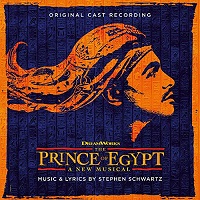 Original London Cast, 2020 (Ghostlight)
Original London Cast, 2020 (Ghostlight)  (3 / 5) Unsurprisingly, no music by Hans Zimmer is to be heard in this stage adaptation of Prince of Egypt, but Stephen Schwartz augmented the film’s song stack to create a full-fledged stage musical that made its debut at TheatreWorks Silicon Valley at the Mountain View Center for the Performing Arts in 2017, then had its international premiere in a Danish production at the Fredericia Teater in April 2018, followed by a summer run at the Royal Danish Theatre in Copenhagen and a presentation at the Tuacahn Amphitheatre in Ivins, Utah. A revised version opened at the Dominion Theatre in London’s West End on February 2020 and, after closing in March of that year due to the COVID-19 pandemic, reopened on July 1, 2021. “Playing With the Big Boys Now” was eliminated from the show score early on (probably for the best), but as noted, many new songs were added, resulting in a cast album that’s full to bursting with 23 tracks (including three reprises). “Deliver Us” makes for a thrilling opening sequence, and the other items retained from the film (“All I Ever Wanted,” “Through Heaven’s Eyes,” “When You Believe”) work equally well as stage musical numbers. Among the major new additions are songs titled “Faster,” “One Weak Link,” “Footprints on the Sand,” “Make it Right,” “Never in a Million Years,” “Always on Your Side,” and “For The Rest of My Life.” If none of these represent Schwartz’s top-shelf work, they are all worthy efforts by one of the musical theater’s greatest composer/lyricists, performed by a strong cast headed by Luke Brady (Moses), Liam Tamne (Ramses), Christine Allado (Tzipporah), Alexia Khadime (Miriam), Joe Dixon (Seti), Debbie Kurup (Queen Tuya), Gary Wilmot (Jethro), Mercedesz Csampai (Yocheved), Adam Pearce (Hotep), Tanisha Spring (Nefertari), and Silas Wyatt-Barke (Aaron). — M.P.
(3 / 5) Unsurprisingly, no music by Hans Zimmer is to be heard in this stage adaptation of Prince of Egypt, but Stephen Schwartz augmented the film’s song stack to create a full-fledged stage musical that made its debut at TheatreWorks Silicon Valley at the Mountain View Center for the Performing Arts in 2017, then had its international premiere in a Danish production at the Fredericia Teater in April 2018, followed by a summer run at the Royal Danish Theatre in Copenhagen and a presentation at the Tuacahn Amphitheatre in Ivins, Utah. A revised version opened at the Dominion Theatre in London’s West End on February 2020 and, after closing in March of that year due to the COVID-19 pandemic, reopened on July 1, 2021. “Playing With the Big Boys Now” was eliminated from the show score early on (probably for the best), but as noted, many new songs were added, resulting in a cast album that’s full to bursting with 23 tracks (including three reprises). “Deliver Us” makes for a thrilling opening sequence, and the other items retained from the film (“All I Ever Wanted,” “Through Heaven’s Eyes,” “When You Believe”) work equally well as stage musical numbers. Among the major new additions are songs titled “Faster,” “One Weak Link,” “Footprints on the Sand,” “Make it Right,” “Never in a Million Years,” “Always on Your Side,” and “For The Rest of My Life.” If none of these represent Schwartz’s top-shelf work, they are all worthy efforts by one of the musical theater’s greatest composer/lyricists, performed by a strong cast headed by Luke Brady (Moses), Liam Tamne (Ramses), Christine Allado (Tzipporah), Alexia Khadime (Miriam), Joe Dixon (Seti), Debbie Kurup (Queen Tuya), Gary Wilmot (Jethro), Mercedesz Csampai (Yocheved), Adam Pearce (Hotep), Tanisha Spring (Nefertari), and Silas Wyatt-Barke (Aaron). — M.P.
Paramour
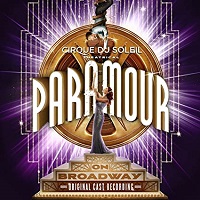 Original Broadway Cast, 2016 (Cirque du Soleil)
Original Broadway Cast, 2016 (Cirque du Soleil)  (2 / 5) With its spectacular entertainments showcasing nouveau-circus acts of all types, accessorized with top-drawer production values and very listenable if somewhat bland music, Cirque du Soleil has experienced great success over the decades since the company’s birth in Quebec in 1984. But Cirque did not have a hit with its 2016 attempt to create a Broadway musical incorporating the sort of acts (aerialists, acrobats, etc.) and accoutrements for which it has become world famous. The show was called Paramour, or rather, Cirque du Soleil Paramour, and simply reading the credits is enough to give one pause. Believe it or not, no book writer is listed, with West Hyler acknowledged only for the “story” and as “scene director.” (So, who wrote the dialogue?) As for the score credits, here you go: music by Bob & Bill (????), co-composer Andreas Carlsson, assistant composer Martin Laniel, lyrics by Andreas Carlsson, additional lyrics by Jenny Stafford. The resulting mess of a show purported to tell a tale of “The Golden Age of Hollywood,” though there were countless anachronisms in the dialogue and only intermittent nods toward period authenticity in the score and the design elements. The plot, such as it is, has the megalomaniacal film director A.J. (Jeremy Kushnier) discovering a potential new movie star in nightclub chanteuse Indigo (Ruby Davis), leading to lots of clichéd goings-on while the audience waits to see if our heroine will eventually end up with her pianist/songwriter, Joey (Ryan Vona), the nice guy who adores her. Given this show’s pedigree and the fact that Cirque did not feel it necessary to hire anyone with traditional musical theater talent or experience to put it together, the cast album is more pleasing if you approach it as a collection of pop songs rather than a recording of a score written to serve a cohesive and compelling narrative, which is certainly not what we have here. From that perspective, three of the most enjoyable items are “A.J.’s Blues” and “The Muse,” both performed for all their worth by Broadway veteran Kushnier; and “Something More,” a pretty ballad persuasively rendered by Davis in her Broadway debut. On the minus side, “Everything (The Lover’s Theme)” and the opening number, “The Hollywood Wiz,” are far too generic to make any significant effect. The same might be said for the bulk of the score. — Michael Portantiere
(2 / 5) With its spectacular entertainments showcasing nouveau-circus acts of all types, accessorized with top-drawer production values and very listenable if somewhat bland music, Cirque du Soleil has experienced great success over the decades since the company’s birth in Quebec in 1984. But Cirque did not have a hit with its 2016 attempt to create a Broadway musical incorporating the sort of acts (aerialists, acrobats, etc.) and accoutrements for which it has become world famous. The show was called Paramour, or rather, Cirque du Soleil Paramour, and simply reading the credits is enough to give one pause. Believe it or not, no book writer is listed, with West Hyler acknowledged only for the “story” and as “scene director.” (So, who wrote the dialogue?) As for the score credits, here you go: music by Bob & Bill (????), co-composer Andreas Carlsson, assistant composer Martin Laniel, lyrics by Andreas Carlsson, additional lyrics by Jenny Stafford. The resulting mess of a show purported to tell a tale of “The Golden Age of Hollywood,” though there were countless anachronisms in the dialogue and only intermittent nods toward period authenticity in the score and the design elements. The plot, such as it is, has the megalomaniacal film director A.J. (Jeremy Kushnier) discovering a potential new movie star in nightclub chanteuse Indigo (Ruby Davis), leading to lots of clichéd goings-on while the audience waits to see if our heroine will eventually end up with her pianist/songwriter, Joey (Ryan Vona), the nice guy who adores her. Given this show’s pedigree and the fact that Cirque did not feel it necessary to hire anyone with traditional musical theater talent or experience to put it together, the cast album is more pleasing if you approach it as a collection of pop songs rather than a recording of a score written to serve a cohesive and compelling narrative, which is certainly not what we have here. From that perspective, three of the most enjoyable items are “A.J.’s Blues” and “The Muse,” both performed for all their worth by Broadway veteran Kushnier; and “Something More,” a pretty ballad persuasively rendered by Davis in her Broadway debut. On the minus side, “Everything (The Lover’s Theme)” and the opening number, “The Hollywood Wiz,” are far too generic to make any significant effect. The same might be said for the bulk of the score. — Michael Portantiere
Passing Strange
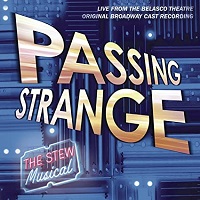 Original Broadway Cast, 2008 (Ghostlight)
Original Broadway Cast, 2008 (Ghostlight)  (4 / 5) Passing Strange is the semi-autobiographical work of singer/songwriter Stew, co-written with his longtime collaborator Heidi Rodewald. The story follows Youth, a young black man played by an explosive Daniel Breaker. Anxious to be an artist and eager to search for what’s real in the world, Youth leaves behind his life of comfort in a California suburb for the exoticism of Europe. In doing so, he ends up cutting ties with everyone in his life — including his loving if not completely understanding mother, a role sung with warmth by Eisa Davis. On stage, Passing Strange was a highly energetic experience for audiences, but also a divisive one. This cast album, recorded live at the Belasco Theatre where the show played, will most likely prove divisive as well. First time listeners may be confused: There is very little dialogue between songs, leaving major gaps in the plot, and the method of the storytelling constantly changes so that characters either sing to each other, about each other, or from the point of view of the Narrator (played by Stew), often within the same song. However, to dismiss Passing Strange because of its non-traditional structure and its difficulty to categorize would be to ignore everything else that the show and this album have to offer. Stew and Rodewald’s music, which they also orchestrated, pulsates with creativity and spirit, whether permeating the air with soothing, lilting ballads such as“Keys (Marianna)” and “Come Down Now” or working up a sweat in “Keys (It’s Alright)” and “Mom Song.” As for Stew’s lyrics, they are artfully crafted while also conveying real emotion and conflict. Before the Broadway production of Passing Strange closed, Spike Lee filmed it; that film can be sought out by anyone who would like a more comprehensive understanding of the piece, and it also allows a greater appreciation of the work of the phenomenal cast. But even on stage, Passing Strange was less concerned with the details of its story than with the emotional potency of its journey. Perhaps if neophytes approached the recording as more of a pop/rock concept album, like Tommy or Jesus Christ Superstar, they’d have a clearer idea of what to expect from this highly creative work. — Matt Koplik
(4 / 5) Passing Strange is the semi-autobiographical work of singer/songwriter Stew, co-written with his longtime collaborator Heidi Rodewald. The story follows Youth, a young black man played by an explosive Daniel Breaker. Anxious to be an artist and eager to search for what’s real in the world, Youth leaves behind his life of comfort in a California suburb for the exoticism of Europe. In doing so, he ends up cutting ties with everyone in his life — including his loving if not completely understanding mother, a role sung with warmth by Eisa Davis. On stage, Passing Strange was a highly energetic experience for audiences, but also a divisive one. This cast album, recorded live at the Belasco Theatre where the show played, will most likely prove divisive as well. First time listeners may be confused: There is very little dialogue between songs, leaving major gaps in the plot, and the method of the storytelling constantly changes so that characters either sing to each other, about each other, or from the point of view of the Narrator (played by Stew), often within the same song. However, to dismiss Passing Strange because of its non-traditional structure and its difficulty to categorize would be to ignore everything else that the show and this album have to offer. Stew and Rodewald’s music, which they also orchestrated, pulsates with creativity and spirit, whether permeating the air with soothing, lilting ballads such as“Keys (Marianna)” and “Come Down Now” or working up a sweat in “Keys (It’s Alright)” and “Mom Song.” As for Stew’s lyrics, they are artfully crafted while also conveying real emotion and conflict. Before the Broadway production of Passing Strange closed, Spike Lee filmed it; that film can be sought out by anyone who would like a more comprehensive understanding of the piece, and it also allows a greater appreciation of the work of the phenomenal cast. But even on stage, Passing Strange was less concerned with the details of its story than with the emotional potency of its journey. Perhaps if neophytes approached the recording as more of a pop/rock concept album, like Tommy or Jesus Christ Superstar, they’d have a clearer idea of what to expect from this highly creative work. — Matt Koplik
Pretty Woman
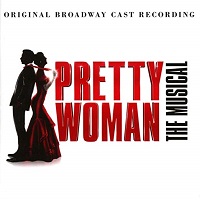 Original Broadway Cast, 2018 (Atlantic) 0 stars; not recommended. Movies that were popular in the latter part of the 20th century have become the go-to source material for Broadway musicals these days. If a film is beloved, a show based on it has a built in audience, and if the movie was made more than 20 years ago, the show can cash in on the “nostalgia factor.” Or so the thinking goes. This cynical mentality is nowhere more prominently seen than in Pretty Woman: The Musical. Based on the wildly successful 1990 romantic comedy, the show tries to please its audience by sticking so closely to the original screenplay that whole scenes are recreated line for line. (Garry Marshall, the film’s director, worked on the libretto with J.F. Lawton before his death in 2016.) It also trades on nostalgia by bringing in ’80s-’90s pop-rock team Bryan Adams and Jim Vallance to write the score, and if none of the songs are offensively unlistenable, they’re all ultimately unnecessary. Each one starts by stating the basic intention of the character singing it, usually at a grooving tempo, with the following verses essentially rewording that same sentiment in a higher key and at a faster tempo. While this allows power belters like Samantha Barks and Orfeh to wail appropriately, it does little for the story. One need only read generic song titles such as “I Can’t Go Back,” “Something About Her” and “Never Give Up On a Dream” to understand the lack of insight Adams and Vallance have brought to the score. Set in a sanitized version of LA, the show follows Vivian (Barks, in the role that made Julia Roberts a movie star), a down-on-her-luck hooker who’s hired by reserved billionaire Edward (Andy Karl) as his escort for the week. After some playful banter and small blowups, the two fall in love, and all turns out well in the end. As Vivian, Barks decides not to channel Roberts’ bubbly charm in the film and go for a more nuanced performance, but her attempts are undermined at every turn by the banality of the lyrics and the repetitiveness of the music. Though Karl’s faux rock and roll growl suits the score’s style, he is ultimately wasted in the role of the withdrawn Edward. As Vivian’s spunky fellow prostitute Kit, Orfeh goes for broke and pulls out every vocal trick she has on songs like “Rodeo Drive” and “Never Give Up on a Dream.” But, like her costars, she’s failed by the lifeless pop tunes. Only Allison Blackwell, in a featured spot, gets any music with energy in it, during the sequence when Edward takes Vivian to the opera — but this is because she gets to sing a bit of La Traviata, which orchestrator/arranger Will Van Dyke seamlessly incorporates into the Adams-Vallance song “You and I.” It’s a memorable moment in a recording you’ll otherwise forget about as soon as you finish listening to it. — Matt Koplik
Original Broadway Cast, 2018 (Atlantic) 0 stars; not recommended. Movies that were popular in the latter part of the 20th century have become the go-to source material for Broadway musicals these days. If a film is beloved, a show based on it has a built in audience, and if the movie was made more than 20 years ago, the show can cash in on the “nostalgia factor.” Or so the thinking goes. This cynical mentality is nowhere more prominently seen than in Pretty Woman: The Musical. Based on the wildly successful 1990 romantic comedy, the show tries to please its audience by sticking so closely to the original screenplay that whole scenes are recreated line for line. (Garry Marshall, the film’s director, worked on the libretto with J.F. Lawton before his death in 2016.) It also trades on nostalgia by bringing in ’80s-’90s pop-rock team Bryan Adams and Jim Vallance to write the score, and if none of the songs are offensively unlistenable, they’re all ultimately unnecessary. Each one starts by stating the basic intention of the character singing it, usually at a grooving tempo, with the following verses essentially rewording that same sentiment in a higher key and at a faster tempo. While this allows power belters like Samantha Barks and Orfeh to wail appropriately, it does little for the story. One need only read generic song titles such as “I Can’t Go Back,” “Something About Her” and “Never Give Up On a Dream” to understand the lack of insight Adams and Vallance have brought to the score. Set in a sanitized version of LA, the show follows Vivian (Barks, in the role that made Julia Roberts a movie star), a down-on-her-luck hooker who’s hired by reserved billionaire Edward (Andy Karl) as his escort for the week. After some playful banter and small blowups, the two fall in love, and all turns out well in the end. As Vivian, Barks decides not to channel Roberts’ bubbly charm in the film and go for a more nuanced performance, but her attempts are undermined at every turn by the banality of the lyrics and the repetitiveness of the music. Though Karl’s faux rock and roll growl suits the score’s style, he is ultimately wasted in the role of the withdrawn Edward. As Vivian’s spunky fellow prostitute Kit, Orfeh goes for broke and pulls out every vocal trick she has on songs like “Rodeo Drive” and “Never Give Up on a Dream.” But, like her costars, she’s failed by the lifeless pop tunes. Only Allison Blackwell, in a featured spot, gets any music with energy in it, during the sequence when Edward takes Vivian to the opera — but this is because she gets to sing a bit of La Traviata, which orchestrator/arranger Will Van Dyke seamlessly incorporates into the Adams-Vallance song “You and I.” It’s a memorable moment in a recording you’ll otherwise forget about as soon as you finish listening to it. — Matt KoplikThe Prom
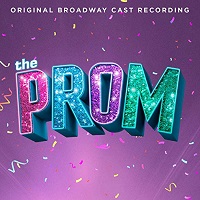 Original Broadway Cast, 2019 (Broadway Records)
Original Broadway Cast, 2019 (Broadway Records)  (4 / 5) The Prom might be described as an old-fashioned musical comedy with a modern sound and up-to-the minute subject matter and plot, about a bunch of vain, self-absorbed, New York theater types who become Social Justice Warriors when they hear that an Indiana high school prom has been canceled to prevent a lesbian student from attending with her girlfriend. The show’s book (by Bob Martin and Chad Beguelin) and score (lyrics by Beguelin, music by Matthew Sklar) offer much hilarity, plus several moments of heartfelt sentiment, as the NYC peeps head to Indiana to try to make everything right. The culture- and ideology-clash results are truly funny through most of the action, yet the show carries a powerful and moving message about inclusiveness. As was the case with the Sklar-Beguelin scores for The Wedding Singer and Elf, the team again provides a clutch of songs notable for pleasing melodies, clever lyrics, and irresistibly catchy “hooks” — such as the sung phrases “One thing’s universal, life’s no dress rehearsal” in “Tonight Belongs to You” and “Build a prom for everyone, show them all it can be done” in “It’s Time to Dance.” As for the ballads, give a listen to “Unruly Heart” and “Dance With You” if you wish to enjoy songwriting of very high quality. The cast is top-notch, with musical comedians Beth Leavel, Brooks Ashmanskas, Angie Schworer, Christopher Sieber, and Josh Lamon all brilliant as the visitors from Broadway, while Caitlin Kinnunen and Isabelle McCalla bring real emotional weight to the relationship of the two girls at the center of the controversy. — Michael Portantiere
(4 / 5) The Prom might be described as an old-fashioned musical comedy with a modern sound and up-to-the minute subject matter and plot, about a bunch of vain, self-absorbed, New York theater types who become Social Justice Warriors when they hear that an Indiana high school prom has been canceled to prevent a lesbian student from attending with her girlfriend. The show’s book (by Bob Martin and Chad Beguelin) and score (lyrics by Beguelin, music by Matthew Sklar) offer much hilarity, plus several moments of heartfelt sentiment, as the NYC peeps head to Indiana to try to make everything right. The culture- and ideology-clash results are truly funny through most of the action, yet the show carries a powerful and moving message about inclusiveness. As was the case with the Sklar-Beguelin scores for The Wedding Singer and Elf, the team again provides a clutch of songs notable for pleasing melodies, clever lyrics, and irresistibly catchy “hooks” — such as the sung phrases “One thing’s universal, life’s no dress rehearsal” in “Tonight Belongs to You” and “Build a prom for everyone, show them all it can be done” in “It’s Time to Dance.” As for the ballads, give a listen to “Unruly Heart” and “Dance With You” if you wish to enjoy songwriting of very high quality. The cast is top-notch, with musical comedians Beth Leavel, Brooks Ashmanskas, Angie Schworer, Christopher Sieber, and Josh Lamon all brilliant as the visitors from Broadway, while Caitlin Kinnunen and Isabelle McCalla bring real emotional weight to the relationship of the two girls at the center of the controversy. — Michael Portantiere
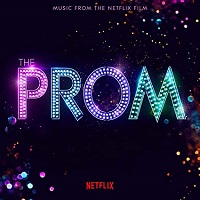 Motion Picture Soundtrack, 2020 (Sony Classical)
Motion Picture Soundtrack, 2020 (Sony Classical)  (3 / 5) Hollywood heavyweight Ryan Murphy loved The Prom so much that he gave the quirky underdog musical a splashy movie adaptation as part of his multi-million dollar production deal with Netflix. Typical of most movie versions of stage musicals (and most Murphy productions), everything here is big and flashy, with a high star quota in the principal roles and an enlarged ensemble of camera-ready young actors as the Indiana high schoolers. The soundtrack is frequently entertaining even as it highlights where and how Murphy often went wrong in his adaptation. From a purely musical standpoint, there’s a lot to recommend. The beefed up orchestrations are generally fantastic, channeling the lush fullness of old-Hollywood musicals. Fans of the stage show can rest easy knowing that no songs were cut for the movie, and that the majority of the celebrity cast members hold their own. Though Nicole Kidman is out of her depth as Angie, providing a rather lost-sounding “Zazz,” the other principals do strong work, with Meryl Streep offering her best singing to date as Dee Dee; those who may have been underwhelmed by her past forays into movie musicals will be surprised by Streep’s vocal command in “It’s Not About Me” and “The Lady’s Improving.” As for Andrew Rannells in the role of Trey, he makes “The Acceptance Song” the comedic highlight of the soundtrack. All of that said, by increasing the volume and brightening the sheen of the property, Murphy has zapped The Prom of a lot of its charm and humor; some of the crasser jokes have been re-written, and much of the dialogue included on the album is spoken with a confident poise that threatens to turn the whole enterprise into the kind of earnest attempt at artistic activism that the stage show was mocking. As the central high school couple, Jo Ellen Pellman and Ariana Debose sing as well as their Broadway counterparts, but they sound too mature to be believable as anxious, overwhelmed teenagers caught in a media frenzy. If this soundtrack loses some of the edge that made The Prom such special fun on stage, it’s still an enjoyable listening experience overall. — Matt Koplik
(3 / 5) Hollywood heavyweight Ryan Murphy loved The Prom so much that he gave the quirky underdog musical a splashy movie adaptation as part of his multi-million dollar production deal with Netflix. Typical of most movie versions of stage musicals (and most Murphy productions), everything here is big and flashy, with a high star quota in the principal roles and an enlarged ensemble of camera-ready young actors as the Indiana high schoolers. The soundtrack is frequently entertaining even as it highlights where and how Murphy often went wrong in his adaptation. From a purely musical standpoint, there’s a lot to recommend. The beefed up orchestrations are generally fantastic, channeling the lush fullness of old-Hollywood musicals. Fans of the stage show can rest easy knowing that no songs were cut for the movie, and that the majority of the celebrity cast members hold their own. Though Nicole Kidman is out of her depth as Angie, providing a rather lost-sounding “Zazz,” the other principals do strong work, with Meryl Streep offering her best singing to date as Dee Dee; those who may have been underwhelmed by her past forays into movie musicals will be surprised by Streep’s vocal command in “It’s Not About Me” and “The Lady’s Improving.” As for Andrew Rannells in the role of Trey, he makes “The Acceptance Song” the comedic highlight of the soundtrack. All of that said, by increasing the volume and brightening the sheen of the property, Murphy has zapped The Prom of a lot of its charm and humor; some of the crasser jokes have been re-written, and much of the dialogue included on the album is spoken with a confident poise that threatens to turn the whole enterprise into the kind of earnest attempt at artistic activism that the stage show was mocking. As the central high school couple, Jo Ellen Pellman and Ariana Debose sing as well as their Broadway counterparts, but they sound too mature to be believable as anxious, overwhelmed teenagers caught in a media frenzy. If this soundtrack loses some of the edge that made The Prom such special fun on stage, it’s still an enjoyable listening experience overall. — Matt Koplik
Once
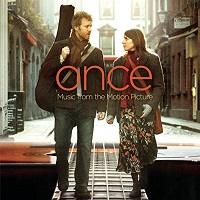 Film Soundtrack, 2007 (Columbia)
Film Soundtrack, 2007 (Columbia)  (4 / 5) This is the deservedly popular soundtrack album of a gorgeously bittersweet indie film, set in Dublin, about the brief but intense romance and songwriting partnership of an Irish busker (Glen Hansard) and a Czech immigrant (Marketa Irglova). Their love affair ends due to other entanglements, but not before they record a demo together — and he buys her a piano as a parting gift. However close to real life the events and characters of the story may or may not be, the whole thing is lent a wonderful air of authenticity by the fact that all of the songs heard in the film and on the recording were written and performed by Hansard and Irglova. The gentle, simple, almost hypnotically lovely ballad “Falling Slowly” was the movie’s big hit, charting in Ireland, Canada, the U.S. and Brazil, and winning an Academy Award for Best Original Song. But there are several other delights here, such as “Say It To Me Now,” “Leave,” and the deliciously quirky “Broken Hearted Hoover Fixer Sucker Guy.” (The Hansard character repairs vacuum cleaners to earn a living.) This recording is eminently listenable and thoroughly enjoyable in its own right, aside from its interest as the soundtrack of a film that served as the basis for one of the most unexpected Broadway musical hits of its era. – Michael Portantiere
(4 / 5) This is the deservedly popular soundtrack album of a gorgeously bittersweet indie film, set in Dublin, about the brief but intense romance and songwriting partnership of an Irish busker (Glen Hansard) and a Czech immigrant (Marketa Irglova). Their love affair ends due to other entanglements, but not before they record a demo together — and he buys her a piano as a parting gift. However close to real life the events and characters of the story may or may not be, the whole thing is lent a wonderful air of authenticity by the fact that all of the songs heard in the film and on the recording were written and performed by Hansard and Irglova. The gentle, simple, almost hypnotically lovely ballad “Falling Slowly” was the movie’s big hit, charting in Ireland, Canada, the U.S. and Brazil, and winning an Academy Award for Best Original Song. But there are several other delights here, such as “Say It To Me Now,” “Leave,” and the deliciously quirky “Broken Hearted Hoover Fixer Sucker Guy.” (The Hansard character repairs vacuum cleaners to earn a living.) This recording is eminently listenable and thoroughly enjoyable in its own right, aside from its interest as the soundtrack of a film that served as the basis for one of the most unexpected Broadway musical hits of its era. – Michael Portantiere
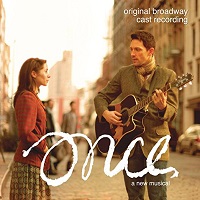 Original Broadway Cast, 2012 (Masterworks Broadway)
Original Broadway Cast, 2012 (Masterworks Broadway)  (4 / 5) It probably never occurred to most fans of the film that a stage musical version of Once would ever be created or that it would be successful anywhere, let alone on Broadway, which generally tends to traffic in larger, faster-paced, less subtle entertainments. But the brief-candle romance of the lovers at the center of the story is potent enough that one could envision such a musical connecting with audiences if pains were taken to assure that the intimacy of the piece was retained. Which is exactly what happened. With a book by Enda Walsh (based on the screenplay by John Carney) and a score comprised almost entirely of the Hansard-Irglova songs from the movie, Once premiered at the American Repertory Theatre (ART) in Cambridge, MA in 2011 before transferring to the New York Theatre Workshop and then to Broadway, where it collected a bunch of 2012 Tony Awards — including Best Musical — and achieved a three-year run. Among the several wise decisions made in adapting the film to the stage were Bob Crowley’s unit set design, which created the feel of a homey Irish pub; and the fact that the cast also served as the onstage orchestra. Steve Kazee as “Guy” is a real charmer in these songs, sounding far more comfortable with this style of music than that of his previous big Broadway lead, Starbuck in 110 in the Shade. He and Cristin Milioti as “Girl” make beautiful music together in “Falling Slowly,” “If You Want Me,” and “When Your Mind’s Made Up.” She also does a persuasive job with “The Hill,” though some may find her rather thick Czech accent a bit distracting on repeated listening. The ensemble of actors/musicians includes familiar names such as as David Patrick Kelly and Anne L. Nathan, along with some super-talented newcomers. Cheers to them as well as to director John Tiffany and musical supervisor Martin Lowe for not radically changing or distorting Once in the stage transfer. – MP
(4 / 5) It probably never occurred to most fans of the film that a stage musical version of Once would ever be created or that it would be successful anywhere, let alone on Broadway, which generally tends to traffic in larger, faster-paced, less subtle entertainments. But the brief-candle romance of the lovers at the center of the story is potent enough that one could envision such a musical connecting with audiences if pains were taken to assure that the intimacy of the piece was retained. Which is exactly what happened. With a book by Enda Walsh (based on the screenplay by John Carney) and a score comprised almost entirely of the Hansard-Irglova songs from the movie, Once premiered at the American Repertory Theatre (ART) in Cambridge, MA in 2011 before transferring to the New York Theatre Workshop and then to Broadway, where it collected a bunch of 2012 Tony Awards — including Best Musical — and achieved a three-year run. Among the several wise decisions made in adapting the film to the stage were Bob Crowley’s unit set design, which created the feel of a homey Irish pub; and the fact that the cast also served as the onstage orchestra. Steve Kazee as “Guy” is a real charmer in these songs, sounding far more comfortable with this style of music than that of his previous big Broadway lead, Starbuck in 110 in the Shade. He and Cristin Milioti as “Girl” make beautiful music together in “Falling Slowly,” “If You Want Me,” and “When Your Mind’s Made Up.” She also does a persuasive job with “The Hill,” though some may find her rather thick Czech accent a bit distracting on repeated listening. The ensemble of actors/musicians includes familiar names such as as David Patrick Kelly and Anne L. Nathan, along with some super-talented newcomers. Cheers to them as well as to director John Tiffany and musical supervisor Martin Lowe for not radically changing or distorting Once in the stage transfer. – MP
Pretty Filthy
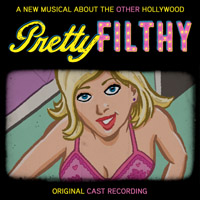 Original Off-Broadway Cast, 2016 (Ghostlight)
Original Off-Broadway Cast, 2016 (Ghostlight)  (3 / 5) Here’s a musical comedy about the porn industry, created by the New York-based theater company The Civilians, with music and lyrics by Michael Friedman (Bloody Bloody Andrew Jackson, Fortress of Solitude, Love’s Labours Lost) and a book by Bess Wohl. One of the best things about the show is its title, which strikes just the right tone of light humor and sweet naughtiness that’s skillfully maintained almost throughout the proceedings, despite the fact that so much of the content is, indeed, pretty filthy. Song titles include “Waiting for Wood,” “Fuck The World,” and “Squirting 101,” and here’s a sample lyric from the opening number: “Most girls give blowjobs to guys they barely know at college parties.” Although the controversial “Parental Advisory: Explicit Lyrics” label is not affixed to this recording, it applies in spades — but honestly, why would anyone who decides to purchase the cast album of a show about “adult entertainment” expect anything else? Some of the melodies Friedman created for this unusual project are very tuneful, but a salient feature of the show — some would say its main problem — is that many of the quotes of the porn actors, directors, and producers seem to have been set to music practically verbatim, with only a little modification and a few rhymes and repetitions thrown in to make them more lyric-like. As a result, significant stretches of the score sound prosaic, and often there’s a sense of too many words having been crammed into each measure of music. Still, there’s a lot of illicit, edgy fun to be had here, thanks in no small part to the perfectly gauged performances of a talented cast: John Behlmann as “Fredo/Jimmy Wood,” Lulu Fall as “Dana,” Alyse Alan Louis as “Becky/Taylor,” Luba Mason as “Georgina Congress,” Maria-Christina Oliveras as “Carrie/Holly Donovan,” Steve Rosen as “Sam Speigel/Jeff/Oscar Gerhard,” Marrick Smith as “Bobby/Dick,” and Jared Zirilli as “Nick Harding.” — Michael Portantiere
(3 / 5) Here’s a musical comedy about the porn industry, created by the New York-based theater company The Civilians, with music and lyrics by Michael Friedman (Bloody Bloody Andrew Jackson, Fortress of Solitude, Love’s Labours Lost) and a book by Bess Wohl. One of the best things about the show is its title, which strikes just the right tone of light humor and sweet naughtiness that’s skillfully maintained almost throughout the proceedings, despite the fact that so much of the content is, indeed, pretty filthy. Song titles include “Waiting for Wood,” “Fuck The World,” and “Squirting 101,” and here’s a sample lyric from the opening number: “Most girls give blowjobs to guys they barely know at college parties.” Although the controversial “Parental Advisory: Explicit Lyrics” label is not affixed to this recording, it applies in spades — but honestly, why would anyone who decides to purchase the cast album of a show about “adult entertainment” expect anything else? Some of the melodies Friedman created for this unusual project are very tuneful, but a salient feature of the show — some would say its main problem — is that many of the quotes of the porn actors, directors, and producers seem to have been set to music practically verbatim, with only a little modification and a few rhymes and repetitions thrown in to make them more lyric-like. As a result, significant stretches of the score sound prosaic, and often there’s a sense of too many words having been crammed into each measure of music. Still, there’s a lot of illicit, edgy fun to be had here, thanks in no small part to the perfectly gauged performances of a talented cast: John Behlmann as “Fredo/Jimmy Wood,” Lulu Fall as “Dana,” Alyse Alan Louis as “Becky/Taylor,” Luba Mason as “Georgina Congress,” Maria-Christina Oliveras as “Carrie/Holly Donovan,” Steve Rosen as “Sam Speigel/Jeff/Oscar Gerhard,” Marrick Smith as “Bobby/Dick,” and Jared Zirilli as “Nick Harding.” — Michael Portantiere
Newsies
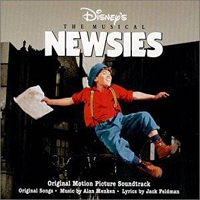 Original Motion Picture Soundtrack, 1992 (Walt Disney)
Original Motion Picture Soundtrack, 1992 (Walt Disney)  (2 / 5) Listening to the soundtrack recording of this 1992 movie that starred a young Christian Bale (well before his days headlining much darker films) and Ann-Margret (an ever-alluring presence on screen and disc), you’d be hard-pressed to understand how it might ever be transformed into a Tony-nominated stage musical. Yes, there are small glimmers of terrific music by Alan Menken and clever lyrics by Jack Feldman, notably in such songs as “Santa Fe” and “The World Will Know.” For the most part, however, everything here feels and sounds overblown and forced, from the performers’ exaggerated “Noo Yawk” accents to the often thundering orchestrations provided by Thomas Pasatieri and Danny Troob, the latter of whom would go on to do some marvelous work for the Broadway incarnation of the tuner. Newsies was actually a flop when originally released to theaters, and only later gained great popularity through home video. For completists (and Ann-Margret fans), there are a couple of numbers, “My Lovey-Dovey Baby” and “High Times, Hard Times,” which didn’t make it to Broadway. And for the generation that fell in love with musicals because of this movie, the soundtrack recording remains something to be cherished. For everyone else, though, it’s best to stick with the Broadway cast album. — Andy Propst
(2 / 5) Listening to the soundtrack recording of this 1992 movie that starred a young Christian Bale (well before his days headlining much darker films) and Ann-Margret (an ever-alluring presence on screen and disc), you’d be hard-pressed to understand how it might ever be transformed into a Tony-nominated stage musical. Yes, there are small glimmers of terrific music by Alan Menken and clever lyrics by Jack Feldman, notably in such songs as “Santa Fe” and “The World Will Know.” For the most part, however, everything here feels and sounds overblown and forced, from the performers’ exaggerated “Noo Yawk” accents to the often thundering orchestrations provided by Thomas Pasatieri and Danny Troob, the latter of whom would go on to do some marvelous work for the Broadway incarnation of the tuner. Newsies was actually a flop when originally released to theaters, and only later gained great popularity through home video. For completists (and Ann-Margret fans), there are a couple of numbers, “My Lovey-Dovey Baby” and “High Times, Hard Times,” which didn’t make it to Broadway. And for the generation that fell in love with musicals because of this movie, the soundtrack recording remains something to be cherished. For everyone else, though, it’s best to stick with the Broadway cast album. — Andy Propst
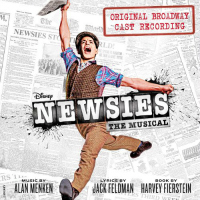 Original Broadway Cast, 2012 (Ghostlight)
Original Broadway Cast, 2012 (Ghostlight)  (4 / 5) Alan Menken employs a semi-period, semi-contemporary musical vocabulary for this stage version of the 1992 Disney film of the same title, to terrific effect, and Jack Feldman’s lyrics have a verve and wit that match the melodies beautifully. For those who grew up on the film about a newsboys’ strike against newspaper owner Joseph Pulitzer, the Broadway cast recording has most of the songs that they loved from the movie score, including the soaring “Santa Fe” and the rousing anthem “Seize the Day,” plus a large handful of new ones written specifically for the stage show. Something else this album has that the film soundtrack doesn’t is the enormously appealing presence of Jeremy Jordan, who, beyond sounding terrific from a musical/vocal standpoint, brings a great balance of streetwise toughness and vulnerability to his portrayal of the strikers’ leader, Jack Kelly. Other fine work includes Kara Lindsay’s smartly pert performance as a girl reporter who becomes Jack’s love interest, and Capathia Jenkins’ saucy turn as a music hall performer. The odd thing about the recording is that the show’s big dance numbers appear twice — once each in truncated form, then again as bonus tracks in full versions with dance breaks that feature Mark Himmel’s arrangements, excitingly orchestrated by Danny Troob. Having the complete tracks at the end of the album means that listeners who want to get a full sense of the show, or to re-experience what they saw in the theater, have to set up a special playlist with the proper run order. It’s cumbersome, and it ultimately detracts from the recording’s ability to genuinely communicate the thrill that live audiences got from this sleeper hit. — A.P.
(4 / 5) Alan Menken employs a semi-period, semi-contemporary musical vocabulary for this stage version of the 1992 Disney film of the same title, to terrific effect, and Jack Feldman’s lyrics have a verve and wit that match the melodies beautifully. For those who grew up on the film about a newsboys’ strike against newspaper owner Joseph Pulitzer, the Broadway cast recording has most of the songs that they loved from the movie score, including the soaring “Santa Fe” and the rousing anthem “Seize the Day,” plus a large handful of new ones written specifically for the stage show. Something else this album has that the film soundtrack doesn’t is the enormously appealing presence of Jeremy Jordan, who, beyond sounding terrific from a musical/vocal standpoint, brings a great balance of streetwise toughness and vulnerability to his portrayal of the strikers’ leader, Jack Kelly. Other fine work includes Kara Lindsay’s smartly pert performance as a girl reporter who becomes Jack’s love interest, and Capathia Jenkins’ saucy turn as a music hall performer. The odd thing about the recording is that the show’s big dance numbers appear twice — once each in truncated form, then again as bonus tracks in full versions with dance breaks that feature Mark Himmel’s arrangements, excitingly orchestrated by Danny Troob. Having the complete tracks at the end of the album means that listeners who want to get a full sense of the show, or to re-experience what they saw in the theater, have to set up a special playlist with the proper run order. It’s cumbersome, and it ultimately detracts from the recording’s ability to genuinely communicate the thrill that live audiences got from this sleeper hit. — A.P.
Next to Normal
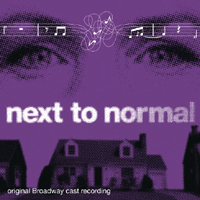 Original Broadway Cast, 2009 (Sh-K-Boom)
Original Broadway Cast, 2009 (Sh-K-Boom)  (5 / 5) If Spring Awakening marked the successful comeback of the original pop/rock musical theater score, then Next to Normal helped insure its future. Part of the reason for the show’s success is that, despite its vibrant energy, it’s a very intimate piece that wears its large heart earnestly on its sleeve. The musical tells of the inner turmoil of a suburban family due to the mental instability of the mother, Diana, who has struggled with bipolar disorder ever since a traumatizing event years earlier: Her son, Gabe, whom she still imagines to be present, died when he was a baby. Although the plot at times borders on being that of a Lifetime Movie, the smart, pulsating score, given a crisp representation on this recording, keeps Next to Normal fresh and inventive. Brian Yorkey’s lyrics are strong and well defined, often bringing a touch of humor to cut the tension in the plot (for example, “My Psychopharmacologist and I”). Tom Kitt composed a score with both fire (“You Don’t Know,” “Didn’t I See This Movie”) and sweet sadness (“I Miss the Mountains”) that he orchestrated excellently with Michael Starobin, making the work electric yet still inherently theatrical. The cast, on the whole, is excellent. Alice Ripley tears into the role of Diana with an abandon that’s fearless, thrilling and at times unnerving. Occasionally, the performer seems so at one with the part that you might fear she won’t even make it to the end of the number — but she always does. J. Robert Spencer is very moving as the silently suffering husband, Dan, and so is Jennifer Damiano as daughter Natalie. Because of the surprises in the plot, listeners who haven’t seen the show will find it especially important to read the synopsis included in the CD booklet in order to make full sense of the story and songs such as “I’m Alive” and “There’s a World,” both sung by Gabe (Aaron Tveit). But they’ll have no problem understanding the emotional potency of each song. — Matt Koplik
(5 / 5) If Spring Awakening marked the successful comeback of the original pop/rock musical theater score, then Next to Normal helped insure its future. Part of the reason for the show’s success is that, despite its vibrant energy, it’s a very intimate piece that wears its large heart earnestly on its sleeve. The musical tells of the inner turmoil of a suburban family due to the mental instability of the mother, Diana, who has struggled with bipolar disorder ever since a traumatizing event years earlier: Her son, Gabe, whom she still imagines to be present, died when he was a baby. Although the plot at times borders on being that of a Lifetime Movie, the smart, pulsating score, given a crisp representation on this recording, keeps Next to Normal fresh and inventive. Brian Yorkey’s lyrics are strong and well defined, often bringing a touch of humor to cut the tension in the plot (for example, “My Psychopharmacologist and I”). Tom Kitt composed a score with both fire (“You Don’t Know,” “Didn’t I See This Movie”) and sweet sadness (“I Miss the Mountains”) that he orchestrated excellently with Michael Starobin, making the work electric yet still inherently theatrical. The cast, on the whole, is excellent. Alice Ripley tears into the role of Diana with an abandon that’s fearless, thrilling and at times unnerving. Occasionally, the performer seems so at one with the part that you might fear she won’t even make it to the end of the number — but she always does. J. Robert Spencer is very moving as the silently suffering husband, Dan, and so is Jennifer Damiano as daughter Natalie. Because of the surprises in the plot, listeners who haven’t seen the show will find it especially important to read the synopsis included in the CD booklet in order to make full sense of the story and songs such as “I’m Alive” and “There’s a World,” both sung by Gabe (Aaron Tveit). But they’ll have no problem understanding the emotional potency of each song. — Matt Koplik
Natasha, Pierre & The Great Comet of 1812
 Original Off-Broadway Cast, 2013 (Ghostlight)
Original Off-Broadway Cast, 2013 (Ghostlight)  (4 / 5) Some musical theater writers have had great difficulty adapting epic, classic novels for the stage: Doctor Zhivago, Jane Eyre, East of Eden, etc. The trouble is, how do you sing a thousand pages or so in two and half hours (or even three hours) without rushing through the story and shortchanging the emotional gravity of the characters? In adapting Tolstoy’s War and Peace as a musical, writer/performer Dave Malloy chose to solve this problem by focusing on a single chapter of the huge novel and expanding it, rather than attempting to condense the entire work. The result is Natasha, Pierre & The Great Comet of 1812, one of the most fascinating and fulfilling scores in recent years. Malloy’s music weaves an elaborate tapestry of wildly varied colors and styles, with influences ranging from Rachmaninoff to ’80s club beats and including everything in between. Songs like the beautiful “No One Else,” the pulsating “Balaga,” or the intense “In My House” couldn’t be more different from each other in many ways — and yet, thanks to Malloy’s smart storytelling and endlessly inventive orchestrations, they all seem part of one score and one vision. As a lyricist, Malloy is quite good, if not as audaciously adventurous as he is musically. His lyrics flexibly move from recitative to poetically mystical musings to characters singing their own stage directions (examples: “Anatole followed in his usual jaunty step,” “I blush happily”). Malloy is also smart enough to know when to directly quote Tolstoy’s vivid prose, and indeed, that’s when the lyrics are at their best. The cast, headed by a pre-Hamilton Phillipa Soo as Natasha and Malloy as Pierre, is fantastic. They craftily embody Tolstoy’s characters with the contemporary spin Malloy has written for them. Soo, in particular, leads the way with a performance that’s stunning in its vocal beauty and non-cloying innocence. Natasha, Pierre enjoyed a successful run Off-Broadway (the basis of this recording) and, after a few false starts, finally came Broadway in the fall of 2016. The Great White Way is more exciting for it. (See review below.) — Matt Koplik
(4 / 5) Some musical theater writers have had great difficulty adapting epic, classic novels for the stage: Doctor Zhivago, Jane Eyre, East of Eden, etc. The trouble is, how do you sing a thousand pages or so in two and half hours (or even three hours) without rushing through the story and shortchanging the emotional gravity of the characters? In adapting Tolstoy’s War and Peace as a musical, writer/performer Dave Malloy chose to solve this problem by focusing on a single chapter of the huge novel and expanding it, rather than attempting to condense the entire work. The result is Natasha, Pierre & The Great Comet of 1812, one of the most fascinating and fulfilling scores in recent years. Malloy’s music weaves an elaborate tapestry of wildly varied colors and styles, with influences ranging from Rachmaninoff to ’80s club beats and including everything in between. Songs like the beautiful “No One Else,” the pulsating “Balaga,” or the intense “In My House” couldn’t be more different from each other in many ways — and yet, thanks to Malloy’s smart storytelling and endlessly inventive orchestrations, they all seem part of one score and one vision. As a lyricist, Malloy is quite good, if not as audaciously adventurous as he is musically. His lyrics flexibly move from recitative to poetically mystical musings to characters singing their own stage directions (examples: “Anatole followed in his usual jaunty step,” “I blush happily”). Malloy is also smart enough to know when to directly quote Tolstoy’s vivid prose, and indeed, that’s when the lyrics are at their best. The cast, headed by a pre-Hamilton Phillipa Soo as Natasha and Malloy as Pierre, is fantastic. They craftily embody Tolstoy’s characters with the contemporary spin Malloy has written for them. Soo, in particular, leads the way with a performance that’s stunning in its vocal beauty and non-cloying innocence. Natasha, Pierre enjoyed a successful run Off-Broadway (the basis of this recording) and, after a few false starts, finally came Broadway in the fall of 2016. The Great White Way is more exciting for it. (See review below.) — Matt Koplik
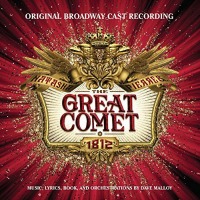 Broadway Cast, 2017 (Reprise)
Broadway Cast, 2017 (Reprise)  (5 / 5) Natasha, Pierre & the Great Comet of 1812 was slightly revised for its transfer to Broadway. Dave Malloy performed some minor surgery on the score, primarily in Act 1, where certain sections are shortened (“The Private and Intimate Life of the House”), tweaked (“The Duel”), or rewritten altogether (“Sunday Morning”). The changes are relatively small in sum, but their impact is immense. Only the expansion of “The Abduction” (adding an extra three minutes) is a slight misstep, as that sequence now overstays its welcome before finally plunging into “In My House.” Malloy also appropriately expanded his vocal arrangements for a larger ensemble, and did some light re-orchestrating for a more sizeable orchestra; the sound is now even more lush than before, but not overwhelming. The majority of the supporting cast is the same here as on the Off Broadway recording, and having now lived with their roles for three years (on and off), most have improved their performances. Brittain Ashford, especially, makes a stronger impression here with a more defined, energetic Sonya, and Lucas Steele provides an even more exotic Anatole, bringing extra heat to the recording. The biggest casting changes are in the two title roles: singing superstar Josh Groban is Pierre, and newcomer Denee Benton is Natasha. Though Benton has a smooth, clear voice, it doesn’t reach the same heights as Phillipa Soo’s; nor is Benton’s performance as endearing as her predecessor’s, and she tends to emphasize Natasha’s naiveté in broad strokes. Still, she does well in quieter moments such as “No One Else,” and in “Pierre and Natasha” with Groban, who brings a great deal of soul to the recording. While Malloy more fully inhabits the “everyman” characteristic of Pierre on the Off-Broadway album, Groban’s voice is stronger and more passionate, his performance deeply moving. Groban also gets a wonderful new song: “Dust and Ashes,” Pierre’s fierce plea to wake from his existential coma. Though some fans of the previous recording may miss Soo’s performance, this one is the definitive representation of Dave Malloy’s masterwork. — M.K.
(5 / 5) Natasha, Pierre & the Great Comet of 1812 was slightly revised for its transfer to Broadway. Dave Malloy performed some minor surgery on the score, primarily in Act 1, where certain sections are shortened (“The Private and Intimate Life of the House”), tweaked (“The Duel”), or rewritten altogether (“Sunday Morning”). The changes are relatively small in sum, but their impact is immense. Only the expansion of “The Abduction” (adding an extra three minutes) is a slight misstep, as that sequence now overstays its welcome before finally plunging into “In My House.” Malloy also appropriately expanded his vocal arrangements for a larger ensemble, and did some light re-orchestrating for a more sizeable orchestra; the sound is now even more lush than before, but not overwhelming. The majority of the supporting cast is the same here as on the Off Broadway recording, and having now lived with their roles for three years (on and off), most have improved their performances. Brittain Ashford, especially, makes a stronger impression here with a more defined, energetic Sonya, and Lucas Steele provides an even more exotic Anatole, bringing extra heat to the recording. The biggest casting changes are in the two title roles: singing superstar Josh Groban is Pierre, and newcomer Denee Benton is Natasha. Though Benton has a smooth, clear voice, it doesn’t reach the same heights as Phillipa Soo’s; nor is Benton’s performance as endearing as her predecessor’s, and she tends to emphasize Natasha’s naiveté in broad strokes. Still, she does well in quieter moments such as “No One Else,” and in “Pierre and Natasha” with Groban, who brings a great deal of soul to the recording. While Malloy more fully inhabits the “everyman” characteristic of Pierre on the Off-Broadway album, Groban’s voice is stronger and more passionate, his performance deeply moving. Groban also gets a wonderful new song: “Dust and Ashes,” Pierre’s fierce plea to wake from his existential coma. Though some fans of the previous recording may miss Soo’s performance, this one is the definitive representation of Dave Malloy’s masterwork. — M.K.Over Here!
 Original Broadway Cast, 1974 (Columbia /Sony)
Original Broadway Cast, 1974 (Columbia /Sony)  (3 / 5) Designed to do for the 1940s what Grease did for the 1950s, Over Here! is a supremely silly tale of romance and espionage on a cross-country train loaded with volunteers, war workers, and Nazi sympathizers. It was a vehicle for the two surviving Andrews Sisters, Patty and Maxene. The score, by Richard M. and Robert B. Sherman, is a pastiche of the period’s hit parade; you’ll hear echoes if not actual excerpts of”Take the ‘A’ Train,” “The Beer Barrel Polka,” and “Boogie Woogie Bugle Boy,” among other songs. It’s all good fun, thanks to the Andrewses, a very strong supporting cast, and electrifying orchestrations by Michael Gibson and Jim Tyler that create an irresistible, big-band frenzy. The opening ballad, “Since You’re Not Around,” strikes the right note of agreeable nostalgia; then April Shawhan and John Driver score with “My Dream for Tomorrow.” The surprisingly tough-minded “Don’t Shoot the Hooey to Me, Louie,” delivered by Samuel E. Wright, touches on the period’s racism. Janie Sell amusingly spoofs Marlene Dietrich in “Wait for Me, Marlena,” and the young John Travolta is smooth as silk in “Dream Drummin’.” The Andrews gals are ebullient in such numbers as “The Big Beat,” “We Got It!” and the title tune. Most of their solos are also effective, but you’ll weep for Patty when she is forced to deliver the sex-hygiene number “The Good-Time Girl,” in which she urges soldiers to avoid “The VD Polka” (“The enemy can sock us / By spreading gonococcus”). Note that the incredible supporting cast of Over Here! included Ann Reinking, Treat Williams, and Marilu Henner, none of whom are heard on this recording in any recognizable way. — David Barbour
(3 / 5) Designed to do for the 1940s what Grease did for the 1950s, Over Here! is a supremely silly tale of romance and espionage on a cross-country train loaded with volunteers, war workers, and Nazi sympathizers. It was a vehicle for the two surviving Andrews Sisters, Patty and Maxene. The score, by Richard M. and Robert B. Sherman, is a pastiche of the period’s hit parade; you’ll hear echoes if not actual excerpts of”Take the ‘A’ Train,” “The Beer Barrel Polka,” and “Boogie Woogie Bugle Boy,” among other songs. It’s all good fun, thanks to the Andrewses, a very strong supporting cast, and electrifying orchestrations by Michael Gibson and Jim Tyler that create an irresistible, big-band frenzy. The opening ballad, “Since You’re Not Around,” strikes the right note of agreeable nostalgia; then April Shawhan and John Driver score with “My Dream for Tomorrow.” The surprisingly tough-minded “Don’t Shoot the Hooey to Me, Louie,” delivered by Samuel E. Wright, touches on the period’s racism. Janie Sell amusingly spoofs Marlene Dietrich in “Wait for Me, Marlena,” and the young John Travolta is smooth as silk in “Dream Drummin’.” The Andrews gals are ebullient in such numbers as “The Big Beat,” “We Got It!” and the title tune. Most of their solos are also effective, but you’ll weep for Patty when she is forced to deliver the sex-hygiene number “The Good-Time Girl,” in which she urges soldiers to avoid “The VD Polka” (“The enemy can sock us / By spreading gonococcus”). Note that the incredible supporting cast of Over Here! included Ann Reinking, Treat Williams, and Marilu Henner, none of whom are heard on this recording in any recognizable way. — David Barbour
Out of This World
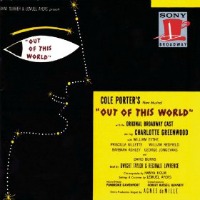 Original Broadway Cast, 1950 (Columbia/Sony)
Original Broadway Cast, 1950 (Columbia/Sony)  (4 / 5) For Out of This World, a modern-day retelling of the Amphitryon legend, Cole Porter produced a gorgeous score. Unfortunately, it was tied to an unwieldy book that worked too hard to substitute dirty jokes for real wit. Despite a lush production, direction by Agnes de Mille, and the Broadway return of the beloved musical comedian Charlotte Greenwood, the show managed only a four-month run. The songs are so great, and the premise so enticing, that there have been a few subsequent attempts to shore up that messy script. Still, the strength of this show lies in its songs. As Juno, Greenwood is wonderful; while the album can’t deliver her high kicks, it does preserve her ringingly funny way with a lyric. William Redfield is competent as Mercury, zipping with ease through the risqué “list” song “They Couldn’t Compare to You,” but the rest of the casting is uneven. George Jongeyans (later Gaynes) is a wobbly Jupiter. Priscilla Gillette’s voice has sufficient firmness for “Use Your Imagination,” but the vocal inadequacies of her vis-a-vis in the show, William Eyrhe, led to the deletion of the score’s best song: “From This Moment On.” In short, this was one unlucky show, but Porter at his near-best is more than ample compensation for the cast album’s disappointments. — Richard Barrios
(4 / 5) For Out of This World, a modern-day retelling of the Amphitryon legend, Cole Porter produced a gorgeous score. Unfortunately, it was tied to an unwieldy book that worked too hard to substitute dirty jokes for real wit. Despite a lush production, direction by Agnes de Mille, and the Broadway return of the beloved musical comedian Charlotte Greenwood, the show managed only a four-month run. The songs are so great, and the premise so enticing, that there have been a few subsequent attempts to shore up that messy script. Still, the strength of this show lies in its songs. As Juno, Greenwood is wonderful; while the album can’t deliver her high kicks, it does preserve her ringingly funny way with a lyric. William Redfield is competent as Mercury, zipping with ease through the risqué “list” song “They Couldn’t Compare to You,” but the rest of the casting is uneven. George Jongeyans (later Gaynes) is a wobbly Jupiter. Priscilla Gillette’s voice has sufficient firmness for “Use Your Imagination,” but the vocal inadequacies of her vis-a-vis in the show, William Eyrhe, led to the deletion of the score’s best song: “From This Moment On.” In short, this was one unlucky show, but Porter at his near-best is more than ample compensation for the cast album’s disappointments. — Richard Barrios
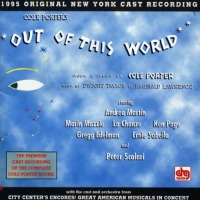 Encores! Concert Cast, 1995 (DRG)
Encores! Concert Cast, 1995 (DRG)  (4 / 5) Out of This World was obvious fodder for a big-league concert performance that could spotlight the songs and stars and elide the worst parts of the script. So it was that the New York City Center Encores! series tackled Cole Porter’s problematic Greco-Roman extravaganza in 1995. The recording that resulted doesn’t always compare favorably with the original Broadway album, but some aspects of it are clearly better and, overall, it’s sheer bliss. Happily, the star at its center is up to her assignment: Andrea Martin is just terrific, especially in her rendition of “I Sleep Easier Now.” For the most part, Ken Page is strong if a dash overbearing as Jupiter; the character should be loud, but there’s always room for shading, isn’t there? In other roles, Marin Mazzie and La Chanze are outstanding, both singing with beauty and spirit. “From This Moment On” is back, and Mazzie and Gregg Edelman do a very good job with it. Peter Scolari is fine as Mercury, Ernie Sabella is a scrappily funny gangster, and Rob Fisher’s Coffee Club Orchestra plays with its customary class. — R.B.
(4 / 5) Out of This World was obvious fodder for a big-league concert performance that could spotlight the songs and stars and elide the worst parts of the script. So it was that the New York City Center Encores! series tackled Cole Porter’s problematic Greco-Roman extravaganza in 1995. The recording that resulted doesn’t always compare favorably with the original Broadway album, but some aspects of it are clearly better and, overall, it’s sheer bliss. Happily, the star at its center is up to her assignment: Andrea Martin is just terrific, especially in her rendition of “I Sleep Easier Now.” For the most part, Ken Page is strong if a dash overbearing as Jupiter; the character should be loud, but there’s always room for shading, isn’t there? In other roles, Marin Mazzie and La Chanze are outstanding, both singing with beauty and spirit. “From This Moment On” is back, and Mazzie and Gregg Edelman do a very good job with it. Peter Scolari is fine as Mercury, Ernie Sabella is a scrappily funny gangster, and Rob Fisher’s Coffee Club Orchestra plays with its customary class. — R.B.
Opal
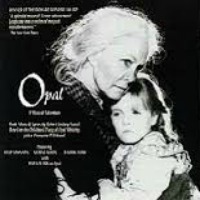 Studio Cast, 1996 (Original Cast Records)
Studio Cast, 1996 (Original Cast Records)  (3 / 5) A Richard Rodgers Award-winner and a minor Off-Broadway hit, this chamber musical by Robert Lindsey-Nassif (or Robert Nassif Lindsey, depending on his preference at any given point in his career) was adapted from the diaries of a French orphan who lived in an Oregon lumber camp circa 1904. It’s a grim tale with a shipwreck, a forest fire, a nasty stepmother with a sad secret, a tragic blind girl, and a Bible-spouting old mystic lady, among other bizarre characters. The lyrics seldom rise above the functional, and the appealing melodies are undercut here by an annoying, synth-heavy orchestration. But what makes the score distinctive is its exploration of the macabre, as little Opal puzzles out the mysteries of death in song. Eliza Clark is refreshingly unaffected in the title role, and she has some formidable musical theater talent behind her: Marni Nixon as the mystic, Rachel York as the blind girl, and Emily Skinner in a small part. The composer-lyricist himself does very well as a lovesick lumberjack in the ballad “Sears and Roebuck Wedding Band.” There are a few dreary numbers, especially those in which the Sunday sermonizing gets heavy. Still, this score has personality — and it should be said that the 1990s brought forth few ensemble numbers as spirited and life affirming as “Everybody’s Looking for Love.” — Marc Miller
(3 / 5) A Richard Rodgers Award-winner and a minor Off-Broadway hit, this chamber musical by Robert Lindsey-Nassif (or Robert Nassif Lindsey, depending on his preference at any given point in his career) was adapted from the diaries of a French orphan who lived in an Oregon lumber camp circa 1904. It’s a grim tale with a shipwreck, a forest fire, a nasty stepmother with a sad secret, a tragic blind girl, and a Bible-spouting old mystic lady, among other bizarre characters. The lyrics seldom rise above the functional, and the appealing melodies are undercut here by an annoying, synth-heavy orchestration. But what makes the score distinctive is its exploration of the macabre, as little Opal puzzles out the mysteries of death in song. Eliza Clark is refreshingly unaffected in the title role, and she has some formidable musical theater talent behind her: Marni Nixon as the mystic, Rachel York as the blind girl, and Emily Skinner in a small part. The composer-lyricist himself does very well as a lovesick lumberjack in the ballad “Sears and Roebuck Wedding Band.” There are a few dreary numbers, especially those in which the Sunday sermonizing gets heavy. Still, this score has personality — and it should be said that the 1990s brought forth few ensemble numbers as spirited and life affirming as “Everybody’s Looking for Love.” — Marc Miller
On Your Toes
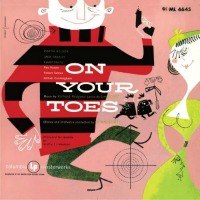 Studio Cast, 1952 (Columbia/Sony)
Studio Cast, 1952 (Columbia/Sony)  (3 / 5) One of musical director/conductor Lehman Engel’s sturdier studio-cast efforts, this rendering of the 1936 hit by Richard Rodgers and Lorenz Hart tries harder than most in the series to sound like a cast album of a stage production. The orchestrations hew closely to Hans Spialek’s originals; Engel even throws in a convincing entr’acte, and his conducting brings out all the urban excitement of the “Slaughter on Tenth Avenue” ballet. Jack Cassidy’s tenor brings sensuousness to “There’s a Small Hotel” and “It’s Got to Be Love.” Portia Nelson is equally effective with “Glad to Be Unhappy,” and Laurel Shelby, a wonderfully dry musical comedian, chews her consonants stylishly in “The Heart Is Quicker Than the Eye” and “Too Good for the Average Man.” The song order is quite inaccurate, some numbers are assigned to the wrong characters, and the album is capped by one of Engel’s annoying greatest-hits finales. Still, it has plenty of theatrical personality — and, of course, the score is evergreen. — Marc Miller
(3 / 5) One of musical director/conductor Lehman Engel’s sturdier studio-cast efforts, this rendering of the 1936 hit by Richard Rodgers and Lorenz Hart tries harder than most in the series to sound like a cast album of a stage production. The orchestrations hew closely to Hans Spialek’s originals; Engel even throws in a convincing entr’acte, and his conducting brings out all the urban excitement of the “Slaughter on Tenth Avenue” ballet. Jack Cassidy’s tenor brings sensuousness to “There’s a Small Hotel” and “It’s Got to Be Love.” Portia Nelson is equally effective with “Glad to Be Unhappy,” and Laurel Shelby, a wonderfully dry musical comedian, chews her consonants stylishly in “The Heart Is Quicker Than the Eye” and “Too Good for the Average Man.” The song order is quite inaccurate, some numbers are assigned to the wrong characters, and the album is capped by one of Engel’s annoying greatest-hits finales. Still, it has plenty of theatrical personality — and, of course, the score is evergreen. — Marc Miller
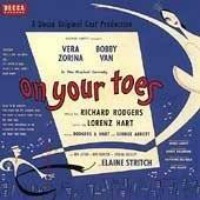 Broadway Cast, 1954 (Decca/Decca Broadway)
Broadway Cast, 1954 (Decca/Decca Broadway)  (2 / 5) The 1954 Broadway revival of On Your Toes starred premiere danseuse Vera Zorina, who had starred in the 1937 London production and the 1939 movie version. But she’s not heard on the cast album — because her character, Vera Barnova, does no singing. Nor is this recording at all faithful to the tone of the show as originally conceived and written; Don Walker’s arrangements, adept enough in their brassy way, don’t feel right for this comparatively gentle and witty score. Light-on-his-feet leading man Bobby Van is also light of voice, and his love interest, Kay Coulter, is a nonentity even in such can’t-miss material as “There’s a Small Hotel” and “Glad to Be Unhappy.” Joshua Shelley, normally a reliable Broadway pro, is almost unintelligible in “Too Good for the Average Man.” But this recording, long out of print and belatedly reissued on CD (with too much treble in the mix), does have its ace in the hole: Elaine Stritch, serving up an unforgettable performance of “You Took Advantage of Me.” It’s a rare instance of a Rodgers and Hart interpolation actually helping one of their scores. — M.M.
(2 / 5) The 1954 Broadway revival of On Your Toes starred premiere danseuse Vera Zorina, who had starred in the 1937 London production and the 1939 movie version. But she’s not heard on the cast album — because her character, Vera Barnova, does no singing. Nor is this recording at all faithful to the tone of the show as originally conceived and written; Don Walker’s arrangements, adept enough in their brassy way, don’t feel right for this comparatively gentle and witty score. Light-on-his-feet leading man Bobby Van is also light of voice, and his love interest, Kay Coulter, is a nonentity even in such can’t-miss material as “There’s a Small Hotel” and “Glad to Be Unhappy.” Joshua Shelley, normally a reliable Broadway pro, is almost unintelligible in “Too Good for the Average Man.” But this recording, long out of print and belatedly reissued on CD (with too much treble in the mix), does have its ace in the hole: Elaine Stritch, serving up an unforgettable performance of “You Took Advantage of Me.” It’s a rare instance of a Rodgers and Hart interpolation actually helping one of their scores. — M.M.
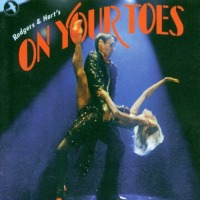 Broadway Cast, 1983 (Polydor/JAY)
Broadway Cast, 1983 (Polydor/JAY)  (4 / 5) Director George Abbott, at age 96, returned to Broadway with this impeccably produced revival and was rewarded with a long run and critical adoration. Hans Spialek, almost as old as Abbott, was on hand to restore his orchestrations; they’re as imaginative and distinctive in 1983 as in 1936, and John Mauceri conducts them like the authority he is. Ballerina Natalia Makarova danced gracefully in this show and also proved herself to be a knockout comedian, but you won’t find her on the cast album because (again) the character she played is not a singing role. However, you will find Christine Andreas as Frankie, offering a definitive “Glad to Be Unhappy.” She overpowers her leading man, Lara Teeter, a brilliant dancer but an uncertain singer. Nor does Dina Merrill, thin of voice and not naturally funny, quite measure up in “The Heart Is Quicker Than the Eye” or “Too Good for the Average Man” — but, luckily for her, she’s wonderfully partnered in “Average Man” by George S. Irving. Overall, this digital stereo recording is a fine preservation of a joyful production. The CD edition includes an extended “Slaughter on Tenth Avenue,” the “Princess Zenobia” ballet, and a sensitive “Quiet Night” reprise by Irving. — M.M.
(4 / 5) Director George Abbott, at age 96, returned to Broadway with this impeccably produced revival and was rewarded with a long run and critical adoration. Hans Spialek, almost as old as Abbott, was on hand to restore his orchestrations; they’re as imaginative and distinctive in 1983 as in 1936, and John Mauceri conducts them like the authority he is. Ballerina Natalia Makarova danced gracefully in this show and also proved herself to be a knockout comedian, but you won’t find her on the cast album because (again) the character she played is not a singing role. However, you will find Christine Andreas as Frankie, offering a definitive “Glad to Be Unhappy.” She overpowers her leading man, Lara Teeter, a brilliant dancer but an uncertain singer. Nor does Dina Merrill, thin of voice and not naturally funny, quite measure up in “The Heart Is Quicker Than the Eye” or “Too Good for the Average Man” — but, luckily for her, she’s wonderfully partnered in “Average Man” by George S. Irving. Overall, this digital stereo recording is a fine preservation of a joyful production. The CD edition includes an extended “Slaughter on Tenth Avenue,” the “Princess Zenobia” ballet, and a sensitive “Quiet Night” reprise by Irving. — M.M.
Onward Victoria
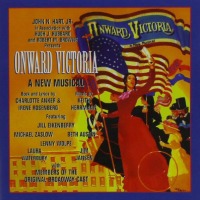 Original Broadway Cast, 1981 (Original Cast Records)
Original Broadway Cast, 1981 (Original Cast Records)  (1 / 5) Although the subject was ripe and the characters were fascinating, Onward Victoria was a one-performance disaster that nonetheless yielded a cast album. The story, by librettists-lyricists Charlotte Anker and Irene Rosenberg, centers on the 19th-century feminist Victoria Woodhull and her adventures in New York with Elizabeth Cady Stanton, Henry Ward Beecher, and other notables. The show’s stirring themes include religious hypocrisy and women’s rights, but the characters tend to sing about these issues in shallow polemics (“Revolution’s in the air like an impending storm”), and Keith Herrmann’s music, while generally constructed as a traditional musical theater score, is styled mostly as soft rock. Jill Eikenberry is a thin-voiced Victoria, and Michael Zaslow is treble-y as Beecher, but Lenny Wolpe has one good moment in “Unescorted Women.” By the time Victoria is defending the good reverend on the witness stand with the striptease-like “A Valentine for Beecher,” in which she sings about how “well-endowed” he is, credibility and good taste have gone out the window. — Marc Miller
(1 / 5) Although the subject was ripe and the characters were fascinating, Onward Victoria was a one-performance disaster that nonetheless yielded a cast album. The story, by librettists-lyricists Charlotte Anker and Irene Rosenberg, centers on the 19th-century feminist Victoria Woodhull and her adventures in New York with Elizabeth Cady Stanton, Henry Ward Beecher, and other notables. The show’s stirring themes include religious hypocrisy and women’s rights, but the characters tend to sing about these issues in shallow polemics (“Revolution’s in the air like an impending storm”), and Keith Herrmann’s music, while generally constructed as a traditional musical theater score, is styled mostly as soft rock. Jill Eikenberry is a thin-voiced Victoria, and Michael Zaslow is treble-y as Beecher, but Lenny Wolpe has one good moment in “Unescorted Women.” By the time Victoria is defending the good reverend on the witness stand with the striptease-like “A Valentine for Beecher,” in which she sings about how “well-endowed” he is, credibility and good taste have gone out the window. — Marc Miller
On the Twentieth Century
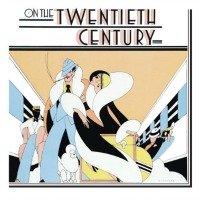 Original Broadway Cast, 1978 (Columbia/Sony)
Original Broadway Cast, 1978 (Columbia/Sony)  (4 / 5) Based on the stage farce Twentieth Century, best known as a Hollywood film starring John Barrymore and Carole Lombard, this 1930s spoof might have been written as a pastiche of that era’s musicals. Instead, composer Cy Coleman and librettists-lyricists Betty Comden and Adolph Green had the inspired idea of treating it as an operetta. That extravagant musical style works brilliantly for this story of dueling egos and theatrical temperaments. John Cullum sings heroically and hilariously as Oscar Jaffee, a bankrupt Broadway producer who is desperate to sign his ex-lover, Hollywood star Lily Garland (née Mildred Plotka), to appear in a bloated stage epic about Mary Magdalene. Almost all of the action takes place during a 16-hour train ride between Chicago and New York. Along for the ride are Kevin Kline, making an uproarious Broadway debut as Hollywood lounge lizard Bruce Granit, and Imogene Coca as the wealthy religious nut Letitia Primose, who offers to finance Oscar’s show with a rubber check. The show is fast, furious, and over the top, its hilarity arising from the tension between Coleman’s rich music and Comden and Green’s skeptical lyrics. Madeline Kahn, who left the show very soon after it opened, thus giving understudy Judy Kaye the break of a lifetime, shines in two riotous numbers: “Veronique” recalls Lily’s stage debut as a virtuous mademoiselle who says no to Bismarck and thereby launches the Franco-Prussian War, while in “Babbette,” Lily alternately imagines herself in the role of the Magdalene and as the star of a play about a Mayfair love triangle. Cullum hams it up gloriously in “I Rise Again” and “The Legacy.” Coca’s big solo, “Repent,” is riotous. Musical comedy is rarely this witty. — David Barbour
(4 / 5) Based on the stage farce Twentieth Century, best known as a Hollywood film starring John Barrymore and Carole Lombard, this 1930s spoof might have been written as a pastiche of that era’s musicals. Instead, composer Cy Coleman and librettists-lyricists Betty Comden and Adolph Green had the inspired idea of treating it as an operetta. That extravagant musical style works brilliantly for this story of dueling egos and theatrical temperaments. John Cullum sings heroically and hilariously as Oscar Jaffee, a bankrupt Broadway producer who is desperate to sign his ex-lover, Hollywood star Lily Garland (née Mildred Plotka), to appear in a bloated stage epic about Mary Magdalene. Almost all of the action takes place during a 16-hour train ride between Chicago and New York. Along for the ride are Kevin Kline, making an uproarious Broadway debut as Hollywood lounge lizard Bruce Granit, and Imogene Coca as the wealthy religious nut Letitia Primose, who offers to finance Oscar’s show with a rubber check. The show is fast, furious, and over the top, its hilarity arising from the tension between Coleman’s rich music and Comden and Green’s skeptical lyrics. Madeline Kahn, who left the show very soon after it opened, thus giving understudy Judy Kaye the break of a lifetime, shines in two riotous numbers: “Veronique” recalls Lily’s stage debut as a virtuous mademoiselle who says no to Bismarck and thereby launches the Franco-Prussian War, while in “Babbette,” Lily alternately imagines herself in the role of the Magdalene and as the star of a play about a Mayfair love triangle. Cullum hams it up gloriously in “I Rise Again” and “The Legacy.” Coca’s big solo, “Repent,” is riotous. Musical comedy is rarely this witty. — David Barbour
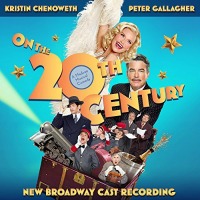 Broadway Cast, 2015 (PS Classics)
Broadway Cast, 2015 (PS Classics)  (3 / 5) In many ways, this recording of the Roundabout Theatre Company’s hit revival lays bare the good-news/bad-news aspects of modern cast albums. Thanks to the expanded capacities of CDs and, especially, streaming services, we get much more of the original properties. Additions here include a longer version of the title song; “Indian Maiden’s Lament,” a Sigmund Romberg/Rudolf Friml spoof that cues Lily’s first entrance; several versions of “I Have Written a Play,” a running gag in which various civilians storm Oscar’s stateroom, announcing their ambitions as dramatists; “Max Jacobs,” which introduces Oscar’s hated professional rival (and former office boy); and the entr’acte and finale ultimo. There’s also much dialogue, delivered with the same screwball spin the cast gave it onstage. Then again, as in virtually all contemporary Broadway revivals, the original orchestrations have been thinned out. There’s nothing essentially wrong about the work of Larry Hochman (with contributions by Bruce Coughlin and James Abbott), but Cy Coleman’s score for On the Twentieth Century employs a sweeping, grand-operetta sound to satirical effect, some of which is inevitably lost here. On the other hand, Kristin Chenoweth as Lily — a role so perfect it could have been written for her — may be said to outdo Madeline Kahn. She sings fabulously, and her version of gin-fueled, Mayfair-set dissipation in “Babette” is a panic. As Oscar, Peter Gallagher avoids Cullum’s John Barrymore imitation (how many in the audience today would get it?), and his vocals aren’t as powerful, but his performance crackles with a wit all its own. Sadly, his 11 o’clock number, “The Legacy,” has a new title (“Because of Her”) and new lyrics by Adolph Green’s daughter, Amanda. The original, a song in which Oscar lists his worldly possessions (“My set of Theodore Dreiser / A portrait of the Kaiser / And a ten-foot stack of unpaid bills”), is pure Comden and Green. The rewrite conscientiously follows the rules of good musical theater craft, making it clear that Oscar needs Lily in order to rekindle his Broadway success; the only problem is, it’s not any fun. As Oscar’s harried associates, Mark Linn-Baker and Michal McGrath benefit the most from the added dialogue excerpts, preserving whole swaths of their wisecracking performances. Mary Louise Wilson’s Letitia Primrose is as delightfully cracked as Imogene Coca’s, but Andy Karl’s Bruce Granit, a performance that was defined mostly by physical comedy, doesn’t register as strongly. — D.B.
(3 / 5) In many ways, this recording of the Roundabout Theatre Company’s hit revival lays bare the good-news/bad-news aspects of modern cast albums. Thanks to the expanded capacities of CDs and, especially, streaming services, we get much more of the original properties. Additions here include a longer version of the title song; “Indian Maiden’s Lament,” a Sigmund Romberg/Rudolf Friml spoof that cues Lily’s first entrance; several versions of “I Have Written a Play,” a running gag in which various civilians storm Oscar’s stateroom, announcing their ambitions as dramatists; “Max Jacobs,” which introduces Oscar’s hated professional rival (and former office boy); and the entr’acte and finale ultimo. There’s also much dialogue, delivered with the same screwball spin the cast gave it onstage. Then again, as in virtually all contemporary Broadway revivals, the original orchestrations have been thinned out. There’s nothing essentially wrong about the work of Larry Hochman (with contributions by Bruce Coughlin and James Abbott), but Cy Coleman’s score for On the Twentieth Century employs a sweeping, grand-operetta sound to satirical effect, some of which is inevitably lost here. On the other hand, Kristin Chenoweth as Lily — a role so perfect it could have been written for her — may be said to outdo Madeline Kahn. She sings fabulously, and her version of gin-fueled, Mayfair-set dissipation in “Babette” is a panic. As Oscar, Peter Gallagher avoids Cullum’s John Barrymore imitation (how many in the audience today would get it?), and his vocals aren’t as powerful, but his performance crackles with a wit all its own. Sadly, his 11 o’clock number, “The Legacy,” has a new title (“Because of Her”) and new lyrics by Adolph Green’s daughter, Amanda. The original, a song in which Oscar lists his worldly possessions (“My set of Theodore Dreiser / A portrait of the Kaiser / And a ten-foot stack of unpaid bills”), is pure Comden and Green. The rewrite conscientiously follows the rules of good musical theater craft, making it clear that Oscar needs Lily in order to rekindle his Broadway success; the only problem is, it’s not any fun. As Oscar’s harried associates, Mark Linn-Baker and Michal McGrath benefit the most from the added dialogue excerpts, preserving whole swaths of their wisecracking performances. Mary Louise Wilson’s Letitia Primrose is as delightfully cracked as Imogene Coca’s, but Andy Karl’s Bruce Granit, a performance that was defined mostly by physical comedy, doesn’t register as strongly. — D.B.

